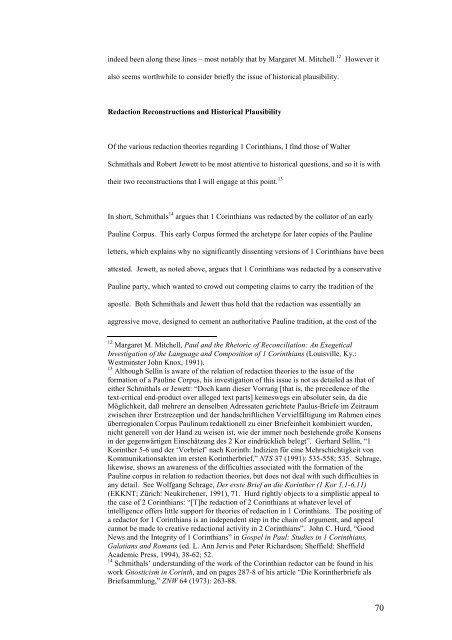PAUL AND THE RHETORIC OF REVERSAL: KERYGMATIC ...
PAUL AND THE RHETORIC OF REVERSAL: KERYGMATIC ...
PAUL AND THE RHETORIC OF REVERSAL: KERYGMATIC ...
Create successful ePaper yourself
Turn your PDF publications into a flip-book with our unique Google optimized e-Paper software.
indeed been along these lines – most notably that by Margaret M. Mitchell. 12 However it<br />
also seems worthwhile to consider briefly the issue of historical plausibility.<br />
Redaction Reconstructions and Historical Plausibility<br />
Of the various redaction theories regarding 1 Corinthians, I find those of Walter<br />
Schmithals and Robert Jewett to be most attentive to historical questions, and so it is with<br />
their two reconstructions that I will engage at this point. 13<br />
In short, Schmithals 14 argues that 1 Corinthians was redacted by the collator of an early<br />
Pauline Corpus. This early Corpus formed the archetype for later copies of the Pauline<br />
letters, which explains why no significantly dissenting versions of 1 Corinthians have been<br />
attested. Jewett, as noted above, argues that 1 Corinthians was redacted by a conservative<br />
Pauline party, which wanted to crowd out competing claims to carry the tradition of the<br />
apostle. Both Schmithals and Jewett thus hold that the redaction was essentially an<br />
aggressive move, designed to cement an authoritative Pauline tradition, at the cost of the<br />
12 Margaret M. Mitchell, Paul and the Rhetoric of Reconciliation: An Exegetical<br />
Investigation of the Language and Composition of 1 Corinthians (Louisville, Ky.:<br />
Westminster John Knox, 1991).<br />
13 Although Sellin is aware of the relation of redaction theories to the issue of the<br />
formation of a Pauline Corpus, his investigation of this issue is not as detailed as that of<br />
either Schmithals or Jewett: “Doch kann dieser Vorrang [that is, the precedence of the<br />
text-critical end-product over alleged text parts] keineswegs ein absoluter sein, da die<br />
Möglichkeit, daß mehrere an denselben Adressaten gerichtete Paulus-Briefe im Zeitraum<br />
zwischen ihrer Erstrezeption und der handschriftlichen Vervielfältigung im Rahmen eines<br />
überregionalen Corpus Paulinum redaktionell zu einer Briefeinheit kombiniert wurden,<br />
nicht generell von der Hand zu weisen ist, wie der immer noch bestehende große Konsens<br />
in der gegenwärtigen Einschätzung des 2 Kor eindrücklich belegt”. Gerhard Sellin, “1<br />
Korinther 5-6 und der ‘Vorbrief’ nach Korinth: Indizien für eine Mehrschichtigkeit von<br />
Kommunikationsakten im ersten Korintherbrief,” NTS 37 (1991): 535-558; 535. Schrage,<br />
likewise, shows an awareness of the difficulties associated with the formation of the<br />
Pauline corpus in relation to redaction theories, but does not deal with such difficulties in<br />
any detail. See Wolfgang Schrage, Der erste Brief an die Korinther (1 Kor 1,1-6,11)<br />
(EKKNT; Zürich: Neukirchener, 1991), 71. Hurd rightly objects to a simplistic appeal to<br />
the case of 2 Corinthians: “[T]he redaction of 2 Corinthians at whatever level of<br />
intelligence offers little support for theories of redaction in 1 Corinthians. The positing of<br />
a redactor for 1 Corinthians is an independent step in the chain of argument, and appeal<br />
cannot be made to creative redactional activity in 2 Corinthians”. John C. Hurd, “Good<br />
News and the Integrity of 1 Corinthians” in Gospel in Paul: Studies in 1 Corinthians,<br />
Galatians and Romans (ed. L. Ann Jervis and Peter Richardson; Sheffield: Sheffield<br />
Academic Press, 1994), 38-62; 52.<br />
14 Schmithals’ understanding of the work of the Corinthian redactor can be found in his<br />
work Gnosticism in Corinth, and on pages 287-8 of his article “Die Korintherbriefe als<br />
Briefsammlung,” ZNW 64 (1973): 263-88.<br />
70
















